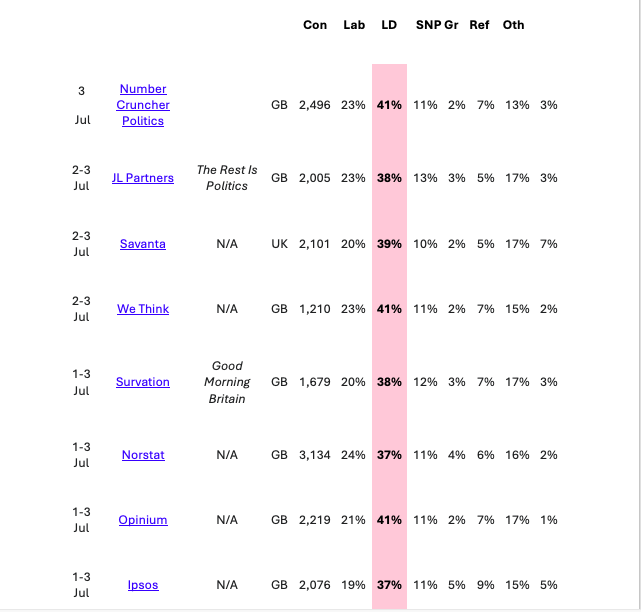General election Opinion Polls – Were they right?

Mike Hedges – MS for Swansea East
The opinion polls in the run up to the 2024 election predicted that Labour would win with a large majority and the Conservatives would do badly which is what happened – but not to the extent the polls expected.
The result was Labour wining 412 seats, the Conservatives 121, Liberal Democrats 72, SNP 9, SF 7, Independent 6, DUP 5, reform 5, Green 4, Plaid Cymru 4, SDLP 2, TUV 1, Alliance 1, UUP 1 and the speaker.
In terms of percentages: Labour 33.70%, Conservative 23.70%, Reform UK 14.29%, Liberal Democrat 12.22%, Green Party of England and Wales 6.40%, Scottish National Party 2.52% 9 Sinn Féin 0.73, Plaid Cymru 0.68%, Democratic Unionist Party 0.60% Alliance 0.41% 1 Ulster Unionist Party .33%.
How does this compare to the opinion polls immediately prior to the general election?
These opinion polls in July took place in the same week as the general election.

Lead
Assuming the 3% margin then only two had the Labour vote overestimated by 3% the others overestimated the Labour vote by up to 7%.
The smallest Labour lead in the opinion polls over the Conservatives was 13% whilst the actual lead was 10%.
The average Labour lead was 17%, with a closer result an enquiry would have taken place into why the polls were wrong.
The last nine polls conducted before polling day suggested that the party would hold between 426 and 517 seats once counting was complete.
The upper estimates were some way off the 412 actually gained.
An average of all polls with fieldwork completed during the seven days to July 2 puts Labour on 40%, 19 points ahead of the Conservatives on 21%, followed by Reform on 16%, the Lib Dems on 11% and the Greens on 6%.
As the media pointed out, there were peculiarities within this election which will have contributed to the differing estimations, including the higher than usual number of voters who remained undecided until polling day, increasing abstentions and votes for local Independents.
The results also reflect a wider history of the polls overestimating Labour support and underestimating that of the Conservatives.
YouGov quizzed some 3,439 adults in Wales between June 19 and June 30 to put
together the most comprehensive survey of public opinion in Wales conducted during this election campaign.
The results were – Labour: 28%, Reform UK: 15%, Do not know: 12%, Conservative: 11%, Will not vote: 11%, Plaid Cymru: 10%, Lib Dem: 5%, Green: 3%, Others: 2% Refused: 3%
Removing the 11% who said they would not vote, the 12% do not know and 3% refused produces a turnout of 74% but we know that turnout was 56%.
Preference
Almost 1 in 5 of the electorate expressed a preference for one party but did not vote.
Removing the 26% who said they would not vote we get Labour on 38%, Reform on 20%, Conservatives on 15%, Plaid Cymru 14%, Lib Dems 7% and Greens 3%.
In Wales, Labour polled 37%, Conservatives 18.2%, Reform 16.9%, Plaid Cymru 14.8%, Liberal Democrats 6.5% and the Green party 4.7%.
The opinion poll got Labour, Plaid Cymru and the Liberal Democrats about right but over estimated Reform and underestimated the Conservatives.
A July 2nd You Gov poll on voting intention poll in Wales for ITV News shows Labour on 40% of the vote, twenty-four points ahead of both the Conservatives and Reform UK, who are tied for second place on 16% apiece.
Plaid Cymru come fourth with 14% of the vote, with the Lib Dems taking 7% and the Greens 5%.
The polls either UK or Wales overestimate Labour, underestimate the Conservatives but get reform, Plaid Cymru, the Liberal Democrats about right.
The methodologies used in opinion polls get “improved” but there is still a problem with their accuracy.
Possible causes of the error could be, people changing their minds late, people not voting after expressing a preference which fits with the turnout being lower or people misleading pollsters either intentionally or unintentionally. Pollsters got a free hit this time because the result was so conclusive.
I finish with two pieces of advice for political commentators – firstly do not produce headlines based upon opinion polls and as politicians are always saying, it is only the official poll that counts
Support our Nation today
For the price of a cup of coffee a month you can help us create an independent, not-for-profit, national news service for the people of Wales, by the people of Wales.






There was one poll that matters. It involved people putting a X in a box.
My biggest takeaway was not the polls, it was the “don’t vote for them but don’t vote for them either”. Seemed to have worked.
There seems to be an amount of buyers remorse since election so the analysis to some extent is irrelevant to the future especially in a Wales context
Starmer’s approval rating has dropped near 10 points since election, Plaid Cymru are running neck and neck with Labour Wales, who are undoubtedly going to suffer vote loss with some of the unpopular decisions being made at UK level, with others to be made in next 3 months.
It will make for a interesting 21 months in Wales.
1. I don’t think the media will take Mike’s advice.
2. The polls were pretty reasonable overall. They are what they are and the vast majority of us understand that they are just estimates.
3. GE polls in Wales are always inaccurate because they never take big enough samples here.
You simply cannot determine turnout from answers to an opinion poll!
Mike hedges, and the people of Swansea east, would be better off if he stuck to his day job!
To Richard Davies if you cannot estimate turnout from opinion poll results then what is their purpose
To Annibendod the Welsh only polls do have the same size samples as the UK polls.